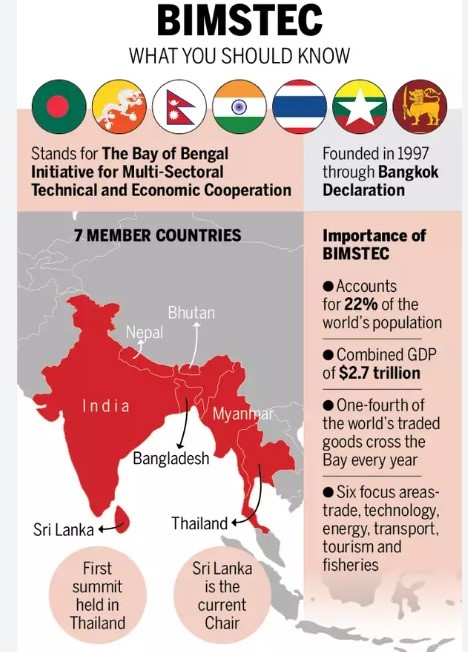27 July 2024 : The Hindu Editorial Analysis
1. A new push in the Bay of Bengal
(Source – The Hindu, Editorial- Page No. -06)
| Topic: GS2 – International Relation |
| Context |
| The articles discusses about the importance of BIMSTEC for India’s foreign policy, especially in the context of its Neighbourhood First and Act East policy highlighting the importance of regional cooperation. |
Analysis of the news:
Earlier this month, India hosted the 2nd BIMSTEC Foreign Ministers’ Retreat in New Delhi. The retreat was held to
- Discuss cooperation in security, connectivity, trade, and investment in the Bay of Bengal region.
- Prepare for the 6th BIMSTEC Summit in September, the first in-person meeting of leaders since the pandemic
- Sign the BIMSTEC Agreement on Maritime Transport Cooperation to enhance regional connectivity, a key objective of the grouping.
About BIMSTEC:

- BIMSTEC is the regional organization devoted to the Bay of Bengal, with a membership of five South Asian and two Southeast Asian countries, cooperating across seven diverse sectors.
- BIMSTEC allows India to engage multilaterally with its eastern neighbours, crucial for its economic development, security, and foreign policy.
Strengthening ties with eastern neighbours
- India aims to strengthen relations with eastern neighbours amidst China’s growing presence in the Bay of Bengal, posing a potential threat to regional stability and India’s security influence.
- Strengthening ties with Bangladesh and Myanmar gives India the advantage of access to landlocked northeastern regions with access to the sea.
- Improved ties with Myanmar and Thailand allow India to increase its presence in the Indo-Pacific region, as both are crucial to the Indo-Pacific region.
- Thailand reinforced this idea at the retreat by identifying itself as a bridge between BIMSTEC and ASEAN.
- While addressing the Retreat, Jaishankar highlighted the importance of BIMSTEC as an intersection of India’s ‘Neighbourhood First’ outlook, the ‘Act East Policy’, and the SAGAR (Security and Growth for All in the Region) vision.
Two parts of the BIMSTEC retreat
In the first segment, participants assessed regional cooperation within BIMSTEC and shared different ideas, such as
- The establishment of Centers of Excellence in member states, focusing on Agriculture, Disaster Management, and Maritime Transport.
- India announced support for cancer research, treatment, and issuance of e-visas for patients of all BIMSTEC states, while Sri Lanka proposed the inclusion of kidney disease.
- It also included the importance of connectivity, cyber-security, and countering the trafficking of narcotics and illegal arms.
In the second session, the expectations of each country from the forthcoming summit were discussed.
- Sri Lanka underscored mapping mineral resources and vertical integration of stages of production stages.
- Bangladesh highlighted the need for cooperation in the Blue Economy and banning fishing during the breeding season.
- Bhutan expounded on the need for collaboration in tourism and cultural exchanges
- Nepal highlighted its ‘whole of the region’ approach to leverage synergies to transform BIMSTEC into a results-oriented regional forum.
- Thailand underscored the need for cooperation in non-traditional security domains and
- Myanmar added the need to combat online scamming to the list. These proposals will be presented to the heads of state before the September summit.
Bilateral merits
India’s Foreign Minister, Jaishankar, held bilateral meetings with counterparts on the retreat’s sidelines.
- He discussed with Myanmar the concerns over border issues (displaced persons, narcotics, arms) and urged the return of unlawfully detained Indians.
- He discussed a smooth supply of daily essentials and a technical team for the Teesta project with Bangladesh, easing a long-pending concern.
- The retreat marked a decade of India’s Act East and Neighbourhood First policies, with BIMSTEC being a key focus for collaborative growth and regional well-being.
- Thus, Jaishankar emphasized the need for new energies and resources and commitment to cooperation for future collaborations.
- The outcome of proposals discussed at the retreat will be seen at the forthcoming Summit, but member states showed a clear intent to push forward with a bold regional vision.


